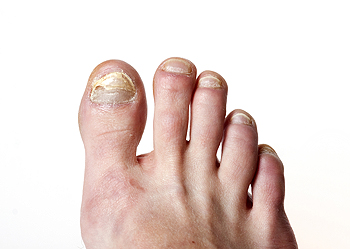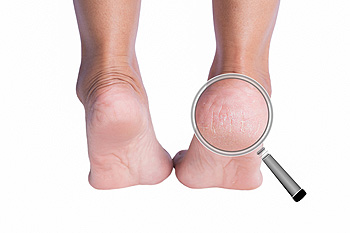 Toenail fungus is a foot condition that can be unsightly. Patients who have this ailment are often embarrassed by the appearance of their feet. It is considered to be contagious, and the fungus that causes the infection is found in public swimming pools, shower room floors, and surrounding areas. The toenail that is most likely to be affected is on the big toe, and one of the first symptoms can be the toenail turning yellow or white. The nail may gradually crumble and lift, and in severe cases, may fall off. If you have toenail fungus, it is strongly suggested that you speak to a podiatrist who can recommend the best treatment option for you.
Toenail fungus is a foot condition that can be unsightly. Patients who have this ailment are often embarrassed by the appearance of their feet. It is considered to be contagious, and the fungus that causes the infection is found in public swimming pools, shower room floors, and surrounding areas. The toenail that is most likely to be affected is on the big toe, and one of the first symptoms can be the toenail turning yellow or white. The nail may gradually crumble and lift, and in severe cases, may fall off. If you have toenail fungus, it is strongly suggested that you speak to a podiatrist who can recommend the best treatment option for you.
If left untreated, toenail fungus may spread to other toenails, skin, or even fingernails. If you suspect you have toenail fungus it is important to seek treatment right away. For more information about treatment, contact one of our podiatrists of PA Foot & Ankle Associates. Our doctors can provide the care you need to keep you pain-free and on your feet.
Symptoms
- Warped or oddly shaped nails
- Yellowish nails
- Loose/separated nail
- Buildup of bits and pieces of nail fragments under the nail
- Brittle, broken, thickened nail
Treatment
If self-care strategies and over-the-counter medications does not help your fungus, your podiatrist may give you a prescription drug instead. Even if you find relief from your toenail fungus symptoms, you may experience a repeat infection in the future.
Prevention
In order to prevent getting toenail fungus in the future, you should always make sure to wash your feet with soap and water. After washing, it is important to dry your feet thoroughly especially in between the toes. When trimming your toenails, be sure to trim straight across instead of in a rounded shape. It is crucial not to cover up discolored nails with nail polish because that will prevent your nail from being able to “breathe”.
In some cases, surgical procedure may be needed to remove the toenail fungus. Consult with your podiatrist about the best treatment options for your case of toenail fungus.
If you have any questions, please feel free to contact one of our offices located in Pennsylvania . We offer the newest diagnostic and treatment technologies for all your foot care needs.
Read more about Toenail Fungus
 Cracked heels can be unsightly and painful. A combination of the foot’s inability to retain moisture and pressure on the foot can cause the skin of the heels to become fragile and eventually crack. Without treatment, the cracks can get deeper and turn into fissures. Common causes of cracked heels include a lack of moisture, vitamin deficiencies, pressure, aging skin, obesity, open footwear, hygiene, or poorly fitted shoes. Various moisturizers are available to help prevent or treat cracked heels. However, if you are suffering from painful cracks, a podiatrist may be able to help you find the source of your problem and provide treatment options.
Cracked heels can be unsightly and painful. A combination of the foot’s inability to retain moisture and pressure on the foot can cause the skin of the heels to become fragile and eventually crack. Without treatment, the cracks can get deeper and turn into fissures. Common causes of cracked heels include a lack of moisture, vitamin deficiencies, pressure, aging skin, obesity, open footwear, hygiene, or poorly fitted shoes. Various moisturizers are available to help prevent or treat cracked heels. However, if you are suffering from painful cracks, a podiatrist may be able to help you find the source of your problem and provide treatment options.
If the skin on your feet starts to crack, you may want to see a podiatrist to find treatment. If you have any concerns, contact one of our podiatrists from PA Foot & Ankle Associates. Our doctors can provide the care you need to keep you pain-free and on your feet.
Cracked Heels
It is important to moisturize your cracked heels in order to prevent pain, bleeding, and infection. The reason cracked heels form is because the skin on the foot is too dry to support the immense pressure placed on them. When the foot expands, the dry skin on the foot begins to split.
Ways to Help Heal Them
- Invest in a good foot cream
- Try Using Petroleum Jelly
- Ease up on Soaps
- Drink Plenty of Water
Ways to Prevent Cracked Heels
- Moisturize After Showering
- Skip a Shower
- Keep Shower Water Lukewarm
- Don’t Scrub Your Feet
If you are unsure how to proceed in treating cracked heels, seek guidance from a podiatrist. Your doctor will help you with any questions or information you may need.
If you have any questions, please feel free to contact one of our offices located in Pennsylvania . We offer the newest diagnostic and treatment technologies for all your foot care needs.
Read more about Solutions for Cracked Heels

